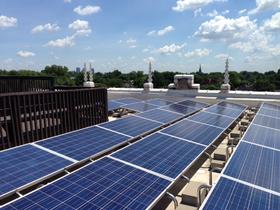Supporters of a "green energy" law passed by
Missouri voters in 2008 are in court seeking to reinstate one of the statute's
key provisions – rebates to individuals and companies that use solar panels to
power their homes and businesses.
Proposition C requires for-profit utility companies to
generate 15 percent of their power from renewable sources by the year 2021, but
it also bars utilities from raising their rates by more than 1 percent to
comply with the voter-approved law. Rebates on solar panel use is one of the
methods for increasing renewable energy in Missouri.
The law was amended last year by the General Assembly in
House Bill 142, requiring for-profit utilities to pay solar rebates through
June 2020 and then gradually to phase out the $2-a-kilowatt rate within the
solar rebates until it zeros out. House Bill 142 also added language that
allows utilities, with permission from the Missouri Public Service Commission,
to stop paying solar rebates if the 1 percent rate cap is exceeded during the
calendar year.
The Missouri Coalition for the Environment and Save Our
Lawfully Authorized Rebates (SOLAR) are suing the Public Service Commission
over how it interpreted the amount of rebates owed by Ameren Missouri and
Kansas City Power and Light, which have since ceased issuing new solar rebates.
During arguments Friday before Cole County Judge Daniel
Green, attorneys for Ameren Missouri tried, but failed, to have earlier
testimony from an "expert witness" stricken from the record.
That witness, identified as Karl Rabago, had provided a sworn affidavit
stating, according to court records, that "the use of solar rebates does
in fact offset a portion of the installation costs of a solar energy system and
serve as an incentive to increase the use of solar energy in Missouri."
Rabago is executive director of the Pace Energy and Climate
Center in White Plains, NY, and principle of Texas-based Rabago Energy.
Stephen Jeffery, an attorney representing SOLAR, argued that
the Public Service Commission used the wrong criteria for granting Ameren
Missouri and Kansas City Power and Light permission to stop issuing solar
rebates.
"The Public Service Commission continued to apply the
(earlier) rule that allowed the utility to base these 1 percent cap determinations
on this 10-year, forward-looking average," Jeffery said. "In
reality, House Bill 142 changed that by saying (that) the utility can ask
permission to stop paying rebates if its determination made on a calendar-year
basis shows that it exceeded the rate cap."
Jeffery also said that the cancelation of solar rebates has
adversely affected home and business owners that had contracts to have solar
panels installed on their properties.
Officials with Ameren and KC P&L maintain that resuming
solar rebates could result in higher electric bills because they would be
forced to raise rates to make up for the money spent on providing the rebates.
Judge Green is expected to issue a ruling at a later date.


No comments:
Post a Comment